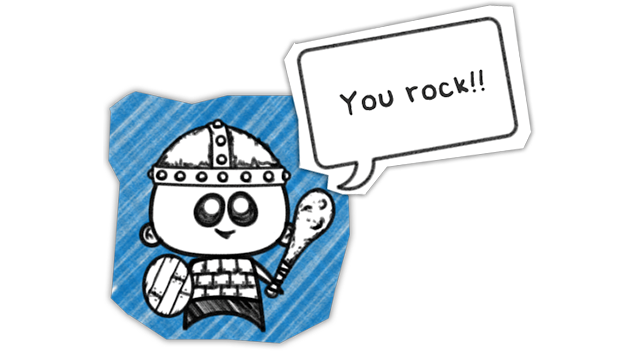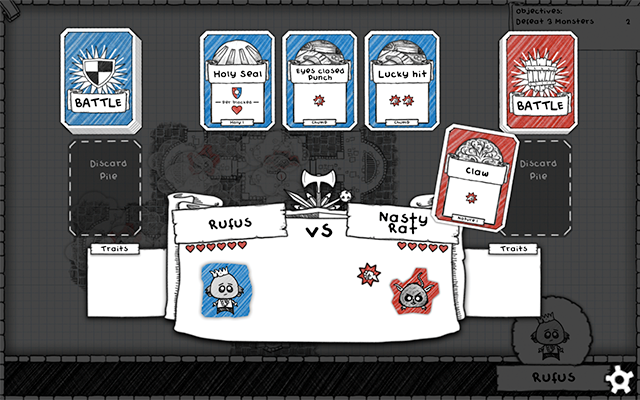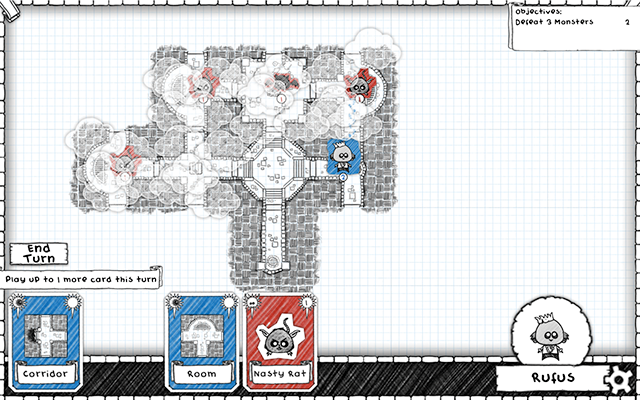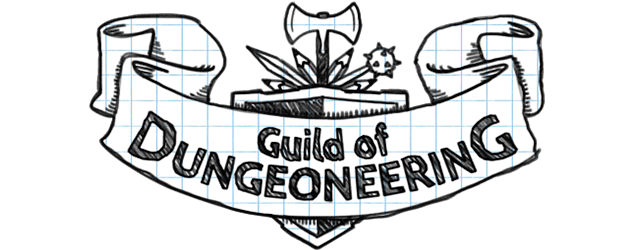“I think we’re lost, but what do we care?” sings the narrator of Guild of Dungeoneering, the new game by Dublin-based indie videogame developer Gambrinous. That silly song, which is sung to a reworking of the Irish traditional “Follow Me Up to Carlow,” is indicative of the fun-at-all-costs ethos that director Colm Larkin and his small team have built into every aspect of the game.

by Brendan Clay
Guild of Dungeoneering is a clever mash-up of dungeon-crawling gameplay and Magic: The Gathering-style collectible card game battles. (A dungeon crawler, for those of our readers not up on their gaming lingo, is a game where players explore a cave, castle, or dungeon searching for “loot”—usually gold or equipment—and fighting monsters.)
In Guild of Dungeoneering, you take on the role of the master of the titular guild, which the game’s intentionally paper-thin narrative casts as slobbish underdogs in competition with the upper-crusty snobs of the Ivory League of Explorers. Rather than explore dungeons yourself, you hire an assorted cast of fumbling misfits to risk their lives on your behalf. Their frequent deaths punctuated by darkly silly “Carlow” parodies are one of the highlights of the writing. In keeping with the game’s sense of humor, your expendable adventurers are twists on the standard roleplaying game classes, like the cat-punning cat burglar that subs in for the thief.
Entering a dungeon brings you to a screen drawn to look like a middle schooler’s doodles on graph paper and deals you a hand of cards depicting monsters, loot, or rooms and corridors. You play the room and corridor cards to build the dungeon around the adventurer, the monster cards to give them monsters to fight in the rooms, and loot cards to make it all worthwhile. Much of the strategy lies in giving your adventurer surmountable obstacles to level them up and trick them out with better gear and cards so they can defeat the game’s mandated monsters. Combat cards are divided into magical and physical attacks and their corresponding defenses. Cards that force discards on the other combatant, restore health, or attack while harming the attacker expand the range of combat tactics, with combinations of simple combat actions layering onto each other to create more complex and more exciting fights.
Because of the nature of games, the humor, while very witty, can frequently tire from repetition. Larkin and his team combat this by emphasizing a general attitude of whimsy and cutesy morbidity—an approach that can be found in a more polished style in places like the original Addams Family New Yorker cartoons. In cases where the writing does fall short, the gameplay is the saving grace, with some new element coming along to challenge you and shake things up whenever you feel yourself getting complacent. And the best part about strong gameplay is that it’s easy to get invested in, so you can be taken utterly by surprise by a new cat pun or a rap-referencing grave-digger gag and find yourself laughing out loud all over again.
The game is available for Microsoft Windows and Mac OS X, and can be purchased through Steam, Humble Bundle, and Gog.com.

Dungeon Crawling with a Pack of Cards:
An interview with Colm Larkin, the director of Guild of Dungeoneering
by Brendan Clay
This Q&A has been significantly edited for length and clarity.
Can you talk about the genesis of Gambrinous?
I started Gambrinous to have a company name while I was making games. That started in 2008. So I was trying to make games in my free time but I basically just failed for many years to finish anything. And in 2013, I started doing smaller projects. I took part in a thing called One Game a Month, which is kind of like a casual monthly game jam. […]. So towards the end of 2013, I took one of those small game jam projects and decided to turn it into a bigger game.
The game itself is pretty interesting, both the art style and a gameplay style. Did one of those direct the other?
So you see kind of the board game references in the game itself, and there’s also card game references. You’re playing a lot with cards, and you’re kind of drawing a map on graph paper. And so the two things do help each other a bit, you know, compliment each other quite well. […] What I wanted more than anything was a distinct look, because I think that’s a mistake a lot of games make. They’ll just make art like other games rather than make art that can look like anything.
Can you talk a little bit about the sense of humor in the game?
The humor kind of came about, because whenever I was writing or picking the themes, it was easier for it to be funny and silly and self referential. […] But humor is difficult. You have to be careful. It gets old quickly. […] For example, the cat burglar is kind of like the thief class, but we called it a cat burglar and made it about being someone who has lots of cats. […] [Players] kind of laugh at the first joke, but then after a while they are kind of amazed by our commitment to it with there are so many different cat puns that it becomes fun again.

Does Ireland have a strong game development community?
There’s a fantastic community here. That’s actually one of my favorite things about working on games in Ireland. […] There’s a couple of really good monthly meet-ups, particularly here in Dublin where I’m based, that are really great. Very casual. Meet in a pub, but a pub where we have space, so people bring their laptops and showcase work they’re working on. […] You could fill a notebook every time you see someone who’s never played your game before play it. And you just watch what they do and don’t do.
What is an attitude and style you think you might see from Ireland as the gaming development community grows?
I’m not sure yet, because I look around, a lot of the smaller games that people are showcasing and games that people are making here, I don’t really see a single shared thing. […] One thing that kind of filtered into Guild of Dungeoneering by accident was the music. The theme tune is based on the traditional Irish song called “Follow Me Down to Carlow.” […] That probably wouldn’t have happened outside Ireland.

